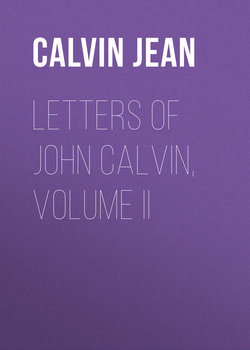Читать книгу Letters of John Calvin, Volume II - Calvin Jean, Jean Calvin - Страница 12
CLV. – To Farel
ОглавлениеPacification of the Church at Neuchatel – report of the speedy arrival of the Emperor in Savoy – dangers at Geneva – withering mention of Francis I
Geneva, 20th February 1546.
I specially congratulate you and all your friends, yea, ourselves also, and the whole Church of Christ, that the Lord has unexpectedly stilled all tumults, by restraining the ungodly. Viret had already requested me to be prepared at all points in case there should be need of my presence, and assuredly I should not have been behind; but God is twice to be praised, who by his own counsel has adjusted matters that were in so great confusion. We acknowledge that he was present with you when he opened up to you that plan of admonishing the heads of the citizens. We again acknowledge a memorable work of his, in having given to you those who of their own accord were disposed to act well towards you. I feel confident that the matter has been brought to a conclusion in harmony with the desire of all good men. If our service be desired, you know that we are all yours. I now hourly expect your brothers. May the Lord restore them to us safe and with good fortune.28 A confident report is spread abroad here of the arrival of the Emperor. I hold it for certain that a passage across will by no means be opened up to him without a bloody conflict. It cannot be doubted, that even though our neighbours were willing that we should be left exposed to the danger of becoming the prey of the conqueror, they would nevertheless find it necessary to guard their own territories; although I do not know why our party have so soon become careless, unless they wished to subject themselves to their sway, and thus save themselves from other masters. It is a hard condition that you must give up your liberty in order to secure allies as defenders.29 Our party erred in one particular, that they made too violent a reply. But what could I do? On me, nevertheless, the odium redounds, though I strove with great vehemence to prevent the ground of it; but I have bid adieu to the perverted judgments of men. I pass on to another subject. Matters will go more severely with Cartelier, because he mixed up with myself part of the Senate. After that I have respectably enough discharged the duty of clemency, I have resolved to halt. The malevolent will heap obloquy upon me, but if there be an opportunity of replying, I have the means of stopping their mouths. No one certainly will allege that any word less than fair fell from me, for among good and bad I have endeavoured to extenuate his offence. The Parliament of Paris, as I hear, now wages war with fire and faggot against Christ.30 It is indeed certain that a great multitude of the godly are everywhere held in bonds. Sardanapalus,31 meanwhile, in the midst of his courtezans, feeds his fancy with victories. May the Lord have respect to his Church!
Adieu, most upright brother in the Lord, together with all your fellow-ministers, whom you will respectfully salute in my name, and in that of the brethren. May Christ ever direct you all by right counsel, and bless your auspicious endeavours. – Yours,
John Calvin.
To the four Presidents of the citizens, special compliments in my name. May the Lord bless them exceedingly.
[Lat. orig. autogr. – Library of Geneva. Vol. 106.]
28
See p. 22, note 2.
29
Allusion to the Bernese and to their pretensions of ruling Geneva under cover of the Alliance. – See p. 28, note 2.
30
The year 1546 was especially remarkable for the great persecutions that arose within the bounds of the jurisdiction of the Parliament of Paris. Meaux, Seulis, Orleans, reckoned numerous martyrs. One named Jean Chapot of Dauphiné, colporteur of Geneva, arrested at Paris, was condemned to death, after having undergone the most cruel tortures. He had his tongue cut out before he was cast into the flames. "The dispersion," says Beza, "was widespread, but it led to the great advancement of many churches which were built up of the stones of that ruin." – Hist. Eccl. tom. i. p. 82. Histoire des Martyrs, pp. 170, 177.
31
Francis I., King of France.
